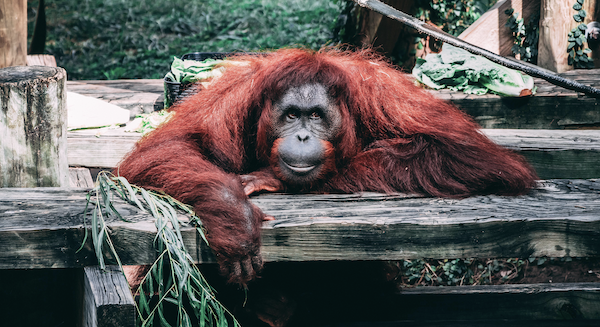
A reader brought to my attention a book by Eugene Linden, The Parrot’s Lament, which relates many interesting stories that demonstrate animal intelligence. Among the most intriguing are a number of accounts about orangutans in captivity. Especially notable is their talent for escaping their confines. They watch and listen as their keepers come and go, devise a method, plan ahead, create tools for the purpose, hide their progress when their work would give away their intent, and ultimately achieve their goal. Once free, they sometimes behave as their visitors do, wandering the grounds and visiting other exhibits; but most often, they simply loll about in front of the enclosures from which they have escaped. They appear to enjoy the challenge of outwitting their keepers, and it is speculated that they appreciate mastering a problem, just as we do.
We All Need Stimulation
All animals appear to need stimulation. Even an amoeba will die if its environment is unchanging. A stimulus is a change, any kind of change. For each individual, comfort is achieved and maintained when there is an optimal level of positively toned stimuli, and we all seek sufficient stimulation to maintain that level.
The confines of a zoo provide much less stimulation than the wilds of a jungle; hence its occupants must find additional stimuli however they can. The process of escape serves this purpose well, as it provides many kinds of stimuli: the challenge of finding the means, the prospect of exploring new territory, but most of all, foiling the keeper.
How Do We Humans Attain Sufficient Stimulation?
Of all animals, we human beings have access to the greatest variety of possible new stimuli because of our intellectual and emotional capacities, the richness of our environment, and the complexity of our interactions with each other. Whether it be meeting with a friend, attending a concert, traveling abroad or climbing a mountain, we seek the stimuli that we need.
Are Problems Useful?
One of the most efficient stimuli, for the purpose of maintaining the optimal stimulus level, is a problem; because until it is solved, it remains an ongoing stimulus. Does this mean that we welcome problems? That depends. The discomfort caused by significant hunger is best solved as soon as possible; but the disequilibration caused by a crossword puzzle can be quite enjoyable.
The Emotional Comfort Tool Can Help
Among the most pleasurable stimuli of all are our major achievements, because they become a source of ongoing positive stimulation. The Emotional Comfort Tool can be very helpful in this regard because, using Step 3, you can create a new mental pathway dedicated to helping you achieve a goal. And every time you use this self-hypnotic technique for any purpose, whether simply to feel peaceful and calm or to create a new mental pathway, all the previous pathways you have created will be activated as well and they will work toward whatever purposes you have created them for.
GET THE COMPLIMENTARY Tool